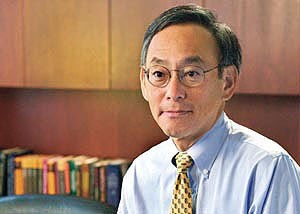Bethe lecturer Steven Chu will offer good and bad news about energy
By Bill Steele
A lot of alternative energy technologies are at best stopgaps and raise new problems that
haven't been widely discussed. There are hopeful new technologies coming round the bend, but they still need a lot of work.
That's what we may expect to hear from Nobel laureate Steven Chu when he delivers the 2008 Hans Bethe Lecture on "The World's Energy Problem and What We Can Do About It," April 16 at 7:30 p.m. in Schwartz Auditorium of Rockefeller Hall.
After sharing the 1997 Nobel Prize in physics for a method of using laser light to cool and trap atoms for study, Chu moved into polymer physics and molecular biology. Now professor of physics and of molecular and cell biology at the University of California-Berkeley and director of the Lawrence Berkeley National Laboratory, he is active in sustainable energy research.
"There are some predictions [about climate change] in the past that are coming true, but coming true much faster than we thought," Chu said in a brief interview. "The probability of some really dire things is significantly higher."
The connections are not always obvious. Water shortages are anticipated in the American Midwest partly because watershed trees are dying, in turn because parasites that prey on the trees are no longer being killed by frost.
The conservation and renewable energy technologies we have now will probably not be enough, he said. Even if solar energy becomes cost-effective and wind energy overcomes "not in my backyard" objections, they will require new storage technology and new distribution facilities to get the energy from the good sites to the end users.
Hopeful new technologies are under study, but he emphasized that they are still unproven. Chu has been heavily involved in research on biological methods of biological methods to convert biomass into fuel. "We've got to transition quickly to using cellulose," he said, noting that crops like switchgrass promise more yield with less energy input and water compared to corn. Because ethanol has low energy density, he said, the next step is to convert sugars and more complex polymers into diesel fuel. "We have a bug that makes a precursor, but we still have to get the yield up," he said, adding on a positive note that the yield has already been increased by eight orders of magnitude.
The Bethe Lecture Series, established by the Department of Physics and the College of Arts and Sciences, honors the late Nobel laureate Hans A. Bethe, Cornell professor emeritus of physics.
Media Contact
Get Cornell news delivered right to your inbox.
Subscribe